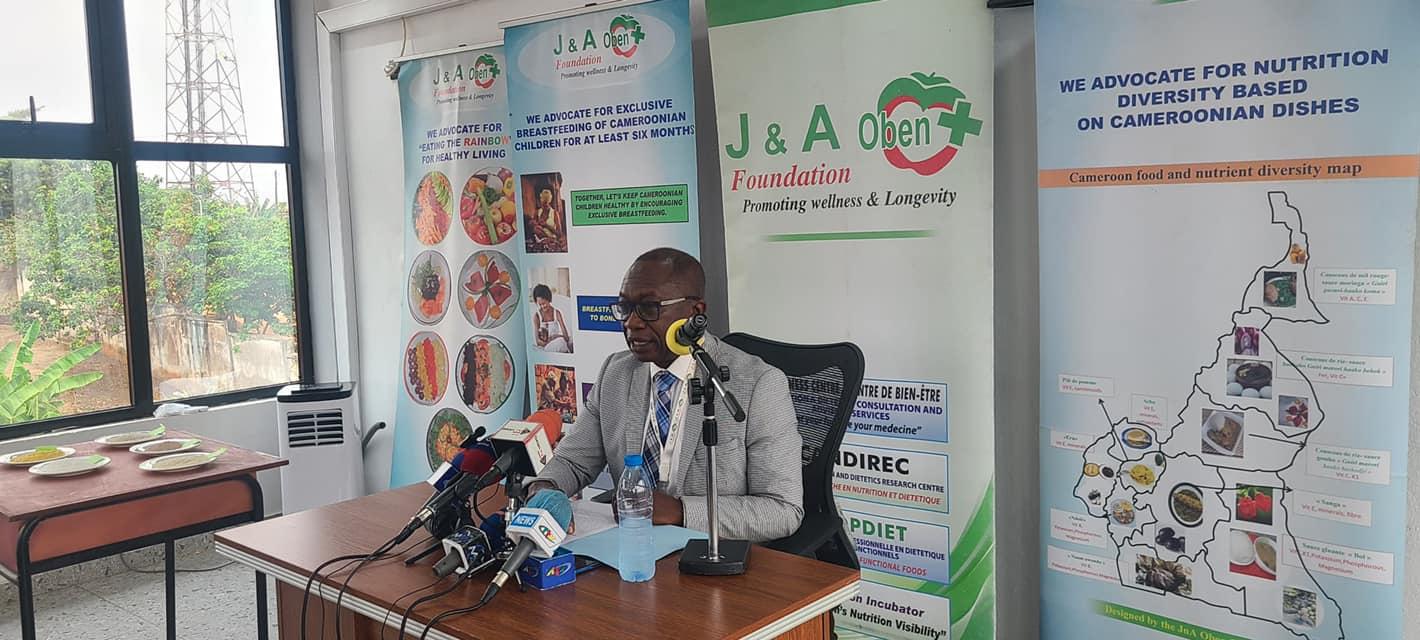J&A Oben Foundation promotes the production and consumption of Cameroonian foods to boost import substitution
By Victorine Neba , Communication & Marketing Officer @ the J & A Oben Foundation
J&A Oben Foundation promotes the production and consumption of Cameroonian foods to boost import substitution
The J&A Oben Foundation has valorized the production and consumption of Cameroonian foods over imported foods in a bid to support and boost the import substitution policy of the government of Cameroon. This was highlighted during a press conference granted by Pr. Julius Oben, President and Co-Founder of the J&A Oben Foundation, on the 28, of February, 2024, at the Foundation’s premises in Yaounde. The press conference was under the theme “Embracing local cuisine and nutritional practices for sustainable import substitution in Cameroon." Its objective was to highlight the key role of local food as a sustainable substitute for imports in Cameroon.
In his press statement, the President and Co-Founder of the J&A Oben Foundation, Prof. Julius Oben, focused on aspects of the trade deficit linked directly to nutrition and health. He also harped on the substitution of carbohydrates, proteins, lipids, and vitamins, which are abundant in cereals, fish, vegetable oils, and medication, respectively, which constitute the bulk of Cameroon’s imports. “According to the National Institute of Statistics, imports into Cameroon increased from 391.98 billion FCFA in February to 429.90 billion FCFA in March of 2023. The country’s main imports are petroleum products, cereals (rice and wheat), fish, medication, and capital equipment. These figures are very significant and explain the country's dependence on its suppliers as well as its growing trade deficit. Something needs to be done!” Prof. Oben stated: In the case of wheat, Prof. Oben said Cameroon has cereals and tubers whose flours can be used as partial or total substitutes in the formulation of wheat-based foods that have become an essential part of Cameroonians’ diets. “These wheat flour substitutes include cassava, maize, plantains, sorghum, and sweet potatoes. They are well-adapted to local climates and have a higher tolerance to drought and diseases, making them more resilient and reliable sources of carbohydrates.
These domestic crops are less exposed to trade disruptions and global inflation, thus offering some protection from food prices that remain near record levels,” he noted. “While the J&A Oben Foundation embarks on nutrition education to raise awareness on the nutritional benefits as well as preparation methods of these wheat substitutes, their production and transformation should be encouraged by the government ministries involved as well as the private sector through GECAM,” he added.
Regrettable situation of the rice sector
Talking about the rice sector, Prof. Oben said: “Unlike wheat, whose production is still in its trial or experimental stage, rice production and commercialization have been going on in Cameroon since the 1960s, when the country was self-sufficient in rice, to the present situation where the country receives rice as food aid." . “In recent years, the J&A Oben Foundation has been able to document the best and most appropriate ways to cook both the commercialized Ndop and Yagoua rice in order to maintain their organoleptic properties and attractiveness,” he added. “It is unthinkable for locally produced rice to be more expensive and therefore less available to the average Cameroonian than foreign imported brands. This is possible due to subventions and low to flexible import duties,” he regretted.
In the case of protein, Pr. Julius Oben said: “The J&A Oben Foundation has been researching and promoting alternative sources of protein that could be valuable substitutes for imported fish." “Our cultivation and use of spirulina, a green algae rich in protein (12% dry weight), can go a long way towards the replacement of imported fish protein. As well as encouraging individuals to grow their own fish, we have encouraged small-scale poultry farmers to increase their production and recently entered into a partnership with C & C Rabbit Empire in Buea, South West Region, to train the local population on rabbit farming as an alternative protein source,” he further detailed.
Cameroonians’ preference for imported or industrialized oils.
Talking about lipids, Prof. Oben regretted that most Cameroonians prefer imported and/or industrialized oils, which are often very expensive. “In contrast, locally there is red palm oil, still known as'red gold’ for the benefits and opportunities it offers. It is a versatile and natural oil renowned for its rich nutritional profile and abundant in essential vitamins and antioxidants, making it a powerful ally in supporting overall well-being,” he said. He added that “red palm oil presents several advantages as a vitamin A deficiency, VAD, reversal tool, is widely available across regions and usually at a relatively low cost, making it more accessible to vulnerable populations in VAD-prone areas; and is commonly used in traditional diets in several countries, making it easier for communities to adopt palm oil-based interventions as part of their daily routines." With all its food resources, Prof. Oben was categorical that: “Cameroon has no business importing food if it makes appropriate use of the food resources available”.



No comments yet. Start a new discussion.